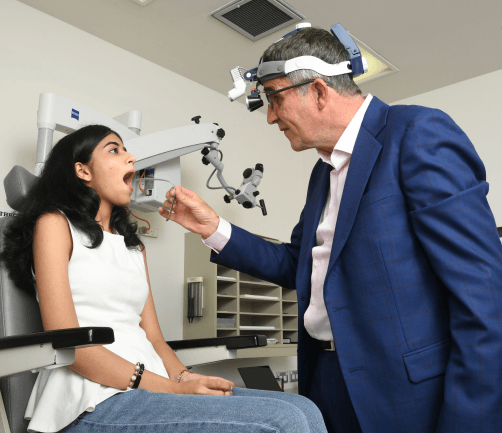Tonsillitis and Tonsillectomy Surgery
Your tonsils are found at the back of your throat next to the dangly bit (uvula). They are oval-shaped pieces of tissue and, like your appendix, are a part of the mucosa-associated lymphoid tissues (MALT). Like your appendix, your body does not require them should they need to be removed. Your adenoids are found behind your nose and out of sight above your soft palate. They are also part of the MALT and are also not essential. Usually, the tonsils and adenoids shrink in size after the age of ten. However sometimes either the tonsils or the adenoids or both remain large.
What is Tonsillitis?
Infection of the tonsils is called tonsillitis. Tonsillitis (acute tonsillitis) can either be caused by a bacterial or viral infection. People with tonsillitis have a sore throat and it hurts to swallow. They often also have a fever, enlarged glands in their neck and feel generally unwell. Your local GP may also inform you that you have swollen tonsils or inflamed tonsils after a check-up.
Acute tonsillitis treatment includes antibiotics for 10 days, pain relief medication and drinking plenty of fluids. Penicillin or amoxicillin are the most effective antibiotics for tonsillitis. The sore throat usually improves within 24 hours of starting antibiotics.

In rare cases, tonsillitis can evolve into a more serious condition called a peritonsillar abscess. A peritonsillar abscess (quinsy) is an abscess occurring between the tonsil and the underlying muscle (superior constrictor). The patient will notice a very sore throat, especially when swallowing and they may also find that they cannot open their mouth fully. The treatment of a peritonsillar abscess is to drain the abscess through the mouth, antibiotics, pain medication and fluids.
Recurrent tonsillitis is the name given to the condition when someone gets repeated bouts of tonsillitis. The frequency of recurrent tonsillitis varies a lot from every month to once every year or two. Patients who have recurrent bouts of tonsillitis benefit from tonsillectomy. Tonsillectomy is the name given to the operation where the tonsils are removed.
Chronic tonsillitis is when tonsillitis symptoms last longer than 2 weeks. Chronic tonsillitis usually occurs in adults. Tonsillectomy surgery is also advised for this condition.

What is Tonsillectomy surgery?
Simply put, tonsillectomy is the name given to the procedure of removing the tonsils. Dr Francis Hall has performed many tonsillectomies on both adults and children who were having troubles with their tonsils. Adenoidectomy is the name given to the procedure to remove the adenoids.
The tonsils are removed through the mouth under general anaesthesia (you are fast asleep). After the procedure, you will have a sore throat for about ten days. We would highly recommend that you take two weeks off work to recover. We also advise taking regular pain relief medication. Dr. Hall will ensure you have the pain medications you need.
During recovery some patients may also find that they have an earache after tonsillectomy. This is due to referred pain coming from the throat – the ear itself is normal.
On the sixth or seventh day after surgery, patients may also find that their throat becomes more sore for a day or two. This is a positive sign that the throat is nearly healed. If you look at your throat after tonsillectomy you will probably see a pale white or grey area where your tonsils used to be. This is a scab forming over the raw surface much the same way as a scab forms on the knee if you graze your knee.
If you would like more information on tonsillitis or tonsillectomy surgery, please give us a call on (09) 281 2963 or book an appointment online to see Dr. Hall today.
What are some other reasons why Tonsillectomy surgery is performed?
The two most common reasons to remove tonsils are recurrent tonsillitis and obstructive symptoms such as snoring and obstructive sleep apnoea (OSA). Other indications for tonsillectomy include tonsil stones, chronic tonsillitis and enlargement of one tonsil.
What causes Tonsil Stones?
Tonsils stones (or tonsilloliths or tonsilliths) are small white, greyish lumps that occur in the tonsils. They are formed by debris that can build up in the tonsils and frequently cause bad breath, a low grade sore throat, sometimes, earache, or a foul taste in your mouth.
Tonsil stone removal can be done at home using a toothbrush, however, they usually recur. Tonsillectomy may be advised as a permanent treatment.
One Big Tonsil
Sometimes one tonsil is much larger than the other. Tonsillectomy is highly recommended if a patient has one big tonsil so the tonsil can be tested and a tumour ruled out. In this situation Dr. Hall recommends removing the big tonsil to ensure that no tumour is present.
Once your tonsils are removed, they are sent to a pathologist who examines them under a microscope to determine if a tumour is present. Dr. Hall will then contact you with the results 1-2 weeks after the procedure.
Obstructive Sleep Apnoea
Obstructive sleep apnoea (OSA) is the name given to the condition when a person’s breathing is obstructed during the night. It is associated with snoring. Sometimes people with OSA wake up during the night gasping for breath. OSA usually leaves the person feeling tired and unrefreshed the next morning.
Most children and some adults with OSA benefit greatly from having their tonsils and adenoids removed. This can be done at the same time and the procedure is called adenoidectomy.
What are the risks of Tonsillectomy?
Usually, there are no complications of tonsillectomy. However, on rare occasions (only about 2-4% of patients), patients may bleed in the three weeks after tonsillectomy surgery. If this happens to you, please give Dr. Hall a call and head to an emergency department to help with the bleeding.
Another uncommon risk of tonsillectomy is a change in taste. However, only 1% of patients may experience this.

